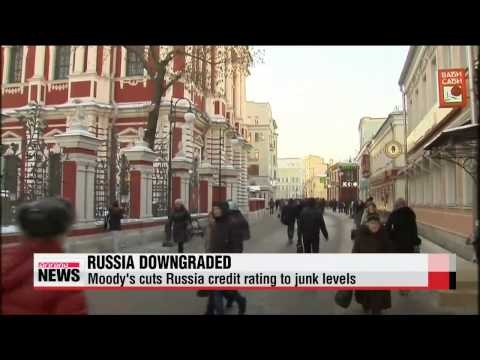Moody’s Cut to Junk Flashing Buyer Beware on Ruble Bonds Bloomberg Business
Post on: 1 Май, 2015 No Comment

A customer counts ruble bank notes in her purse at the check-outs inside a Perekrestok supermarket in Moscow. Russia’s economy has been battered by sanctions that cut the nation’s companies off from Western financial markets Photographer: Andrey Rudakov/Bloomberg
(Bloomberg) — Moody’s Investors Service is giving some traders in Russian ruble bonds pause.
Russia’s cut to junk on Friday, the second this year, was a reminder of the perilous state of the economy. Sanctions, lower oil prices and the erosion of foreign-exchange reserves were all cited by Moody’s as contributing to the downgrade.
None of those things have been enough to stop ruble bonds from earning 6.6 percent in February, headed for the best month since October 2009, according to Bank of America Merrill Lynch data. The currency sank 1.6 percent Tuesday, signaling the rally may peter out as Brent crude traded below $60 a barrel.
The downgrade “shows just how far Russia’s fundamentals have deteriorated over the past year,” Neil Shearing, the London-based chief economist for emerging markets at Capital Economics Ltd. said by phone Monday. “We could see local currency yields edge up again. They’ve been falling in recent weeks, this could halt that decline.”
The yield on Russia’s 159 million rubles ($1.5 million) of 7 percent bonds maturing in August 2023 jumped 65 basis points to 13.21 percent Tuesday, from as high as 16.2 percent on Jan. 9. The ruble’s slide trimmed its month-to-date advance to 10 percent and it traded at 63.1010 at 5:12 p.m. in Moscow. Russian markets were closed yesterday for a public holiday.
Russian assets rallied this month as oil rebounded from a six-year low and a cease-fire agreement was signed to end fighting in eastern Ukraine.
Oil Rebound
Brent crude, the oil benchmark used to track Russia’s main oil grade, gained 32 percent since touching $45.19 on Jan. 13, the lowest level since March 2009. It’s still down almost 50 percent since last year’s June high.
Russia’s economy has also been battered by sanctions that cut the nation’s companies off from Western financial markets. Gross domestic product will contract by 4 percent this year, according to the median of 34 estimates compiled by Bloomberg.
Moody’s move follows Standard & Poor’s, which lowered Russia to non-investment grade on Jan. 26. A second junk rating makes the debt ineligible for some funds that benchmark their performance against investment-grade indexes. Fitch Ratings lowered Russia to BBB- on Jan. 9, one level above junk.
Thanks to forward guidance from Moody’s, the amount of forced selling immediately following Friday’s downgrade will be “limited,” Peter Montalto, a London-based economist at Nomura International Plc, said by phone on Monday. “A lot of people can pre-position on these things.”
A sub-investment grade rating will lead to the exclusion of Russian foreign-currency bonds from Barclays Global Aggregate Index, forcing an outflow of $3.5 billion to $4.5 billion out of Russian foreign-currency debt, Barclays analysts said in an e-mailed note on Tuesday. The yield on dollar bonds maturing in March 2030 dropped six basis points today after climbing 24 basis points on Monday.
‘Ruthless Attacks’
Moody’s cut Russia to its lowest investment grade on Jan. 16 and said it was on review for a further downgrade.
Investors often disregard ratings companies’ credit grade and outlook changes. Yields on Russia’s 2023 ruble bonds rose 23 basis points on the first trading day after the S&P downgrade and fell by the same amount the following day.
U.S. Secretary of State John Kerry on Saturday warned more sanctions may be imposed against Russia if violations of the cease-fire are maintained. European Union President Donald Tusk said Friday he’d start consultations on new steps “to increase further the costs of aggression on eastern Ukraine” in response to continued “ruthless attacks” by the rebels.
“Now it will be interesting to see what is quicker: The Fitch regular update or an improvement in the relations between Russia and the west that could lead to a run-off of sanctions in July 2015,” Lutz Roehmeyer, a money manager at Landesbank Berlin Investment, said by e-mail on Monday. “I think Fitch will downgrade before the sanctions are removed.”
To contact the reporter on this story: Natasha Doff in London at ndoff@bloomberg.net
To contact the editors responsible for this story: Daliah Merzaban at dmerzaban@bloomberg.net Matthew Brown














